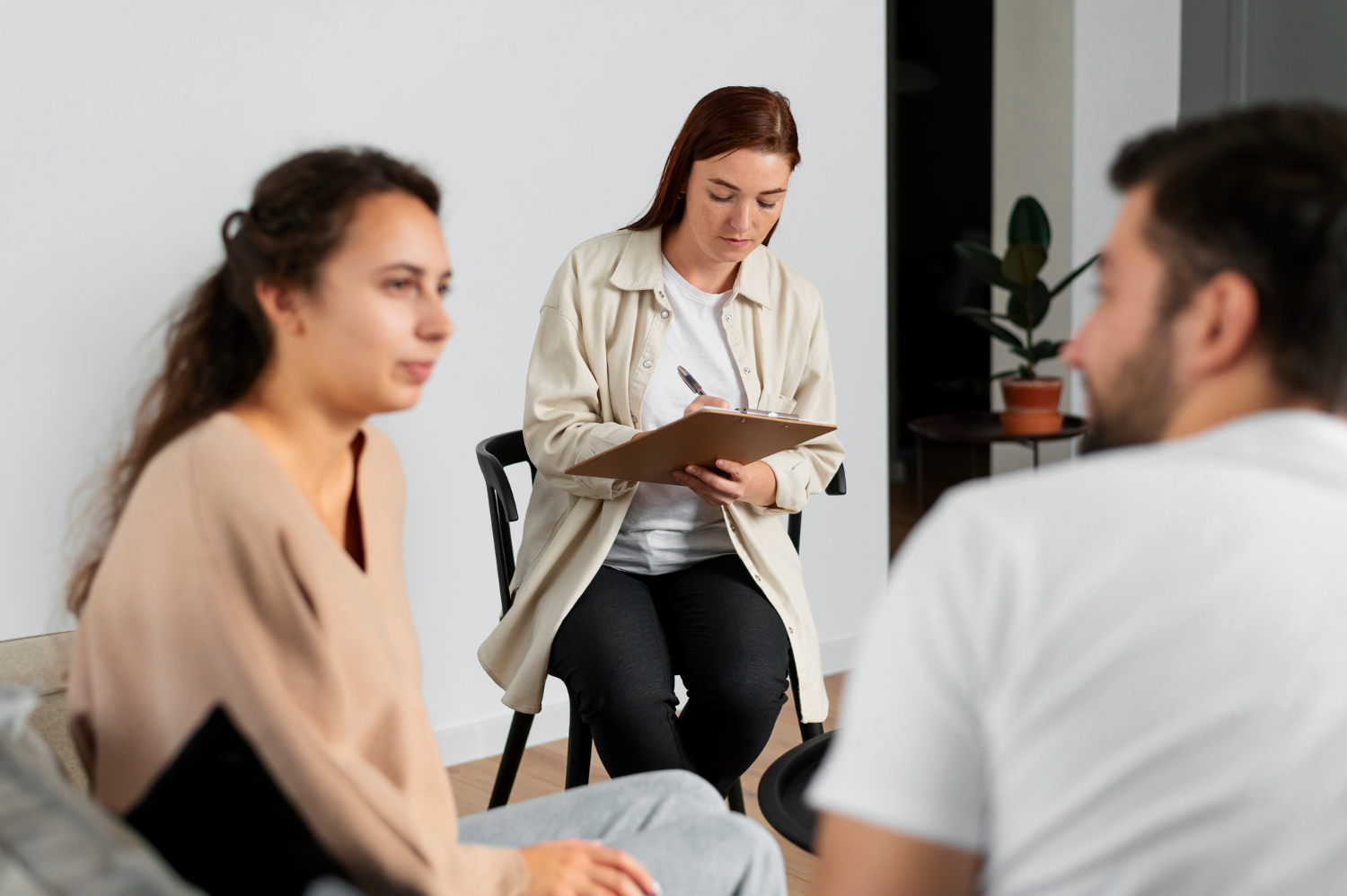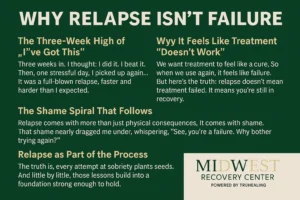The Three-Week High of “I’ve Got This”
When I first stepped into treatment, I told myself it was temporary. I wasn’t like the “real addicts,” the ones who had lost everything. I still had a job. I still showed up for family dinners, even if I was half-numb while doing it. I thought I just needed a tune-up, a break from the cycle, and then I could slide back into life on my own terms.
And at first, it felt like I was right.
The first three weeks were a rush of newness. My body stopped aching in the mornings. I could eat food again and actually taste it. My family looked at me with relief instead of disappointment. I even laughed—really laughed—for the first time in years.
Three weeks in, I thought: I did it. I beat it.
Then, one stressful day, I picked up again. Just one time, I told myself. Except it wasn’t one time. It was a full-blown relapse, faster and harder than I expected. Everything I’d built in those three weeks crumbled, and shame flooded in.
That’s when the voice in my head said the words that almost broke me: Treatment didn’t work.
Why It Feels Like Treatment “Doesn’t Work”
When you’re coming off opioids, the cravings don’t politely leave after a few weeks. Your brain chemistry has been rewired, and it takes time—sometimes months or years—for balance to return.
The problem is, most of us want instant results. We want treatment to feel like a cure. So when we hit a craving, a trigger, or a bad day, and we use again, it feels like failure.
But here’s the truth: relapse doesn’t mean treatment failed. It means you’re still in recovery. And recovery is not a single finish line—it’s a process of learning, adjusting, and continuing even after the stumbles.
The Shame Spiral That Follows
Relapse comes with more than just physical consequences. It comes with shame.
The day I relapsed, I didn’t want to pick up the phone and admit it. I didn’t want to face my counselor or my family. I told myself I was hopeless, that I’d wasted everyone’s time.
That shame nearly dragged me under. It whispered, See, you’re a failure. Why bother trying again?
What pulled me out was sitting in a group session weeks later, listening to someone else say: “Relapse isn’t the end. It’s information.”
That line changed how I saw my journey. Relapse didn’t erase my three weeks sober—it taught me what I hadn’t yet prepared for. It showed me where the cracks were.
And that’s when I realized: treatment hadn’t failed me. I just needed more of it.
What Opioid Addiction Treatment Actually Gives You
When you hear “opioid addiction treatment,” you might think of detox beds, cold sweats, and endless group meetings. But treatment is more than just surviving withdrawal.
At Midwest Recovery Center’s opioid addiction treatment in Toledo, Ohio, the focus isn’t just on stopping the drug. It’s on building a life you can actually live without it. That means:
- Medical care: Stabilizing your body so you can heal physically, not just white-knuckle it.
- Therapy: Digging into the trauma, stress, and pain that opioids were covering up.
- Skills training: Learning how to handle cravings, stress, and emotional lows without turning back to using.
- Community: Finding peers who know exactly what it feels like to fight cravings at 3 a.m. or wake up terrified after relapse.
- Planning: Building a next-step map so you don’t leave treatment and fall straight back into the same cycle.
The first time I went through, I thought I didn’t need half of that. The second time, I realized it was the only way forward.
Relapse as Part of the Process
I used to believe relapse erased all progress. That if I fell, it meant I was back at square one. But the truth is, every attempt at sobriety plants seeds.
The first time around, I learned what my cravings felt like without opioids numbing me. The second time, I learned which people and places triggered me most. The third time, I finally started telling the truth instead of hiding behind jokes or silence.
That’s the process. Each attempt teaches you something you carry into the next. And little by little, those lessons build into a foundation strong enough to hold.
Recovery isn’t about perfection. It’s about persistence.
Local Care, Real Connection
The good news? You don’t have to fight this fight alone—or travel far to get help.
If you’re in northwest Ohio, options exist close to home. Looking for opioid addiction treatment in Maumee, Ohio? Midwest Recovery Center offers programs within reach, so you can get intensive help while staying connected to your life.
Or maybe you live in Perrysburg, Ohio and worry that going back to treatment makes you look weak. The truth? Walking back in makes you strong. Because showing up again, after relapse, is one of the hardest things you’ll ever do—and one of the most life-saving.
Recovery doesn’t ask you to be perfect. It just asks you to keep showing up.
What I Wish I’d Known the First Time
Looking back, here’s what I wish someone had told me before I ever walked into my first program:
- You will want to quit treatment before it’s over. That doesn’t mean you’re hopeless—it means your brain is still healing.
- Relapse doesn’t erase progress. It shows you where you need more support.
- You’re not weak for needing treatment more than once. Most people do.
- The people in treatment aren’t “different” from you. They are you. Just at different points in the journey.
- Shame is a liar. It tells you to give up, but recovery gives you reasons to keep going.
If I had known those truths, maybe I wouldn’t have felt so crushed by relapse. But learning them the hard way also taught me something important: recovery isn’t about speed. It’s about staying in the fight.
The Line That Saved Me
There was one sentence that carried me through when I wanted to give up: “Relapse is a chapter, not the whole story.”
That line reminded me that relapse didn’t define me. What I chose next did.
So I chose to try again. And again. And eventually, those “agains” added up to real recovery.
FAQs
What is opioid addiction treatment?
Opioid addiction treatment combines medical care, therapy, and support services to help you safely stop using opioids and build long-term recovery.
Does relapse mean treatment failed?
No. Relapse is common and often part of the recovery process. It doesn’t erase your progress—it shows where more support is needed.
How long does treatment last?
It depends on your situation. Some people benefit from short-term care, while others need extended treatment. Midwest Recovery Center tailors programs to you.
What if I’ve tried treatment before and relapsed?
You’re not alone. Many people return to treatment after relapse. Each attempt teaches you something new that strengthens your next recovery effort.
Can treatment help with mental health too?
Yes. Most opioid addiction treatment programs address co-occurring conditions like anxiety, depression, or trauma. At Midwest Recovery Center, both are treated together.
Do I have to leave home to get treatment?
Not always. Options like partial hospitalization or intensive outpatient care allow you to live at home while receiving structured, daily treatment.
Take the Next Step
If you’ve relapsed and feel like treatment “didn’t work,” you’re not broken. You’re human. Recovery isn’t about never falling—it’s about refusing to stay down.
Call (888) 657-0858 or visit opioid addiction treatment in Toledo, Ohio to learn how we can help you get back up again.
Because relapse isn’t the end of your story—it’s the moment you decide to keep writing it.









